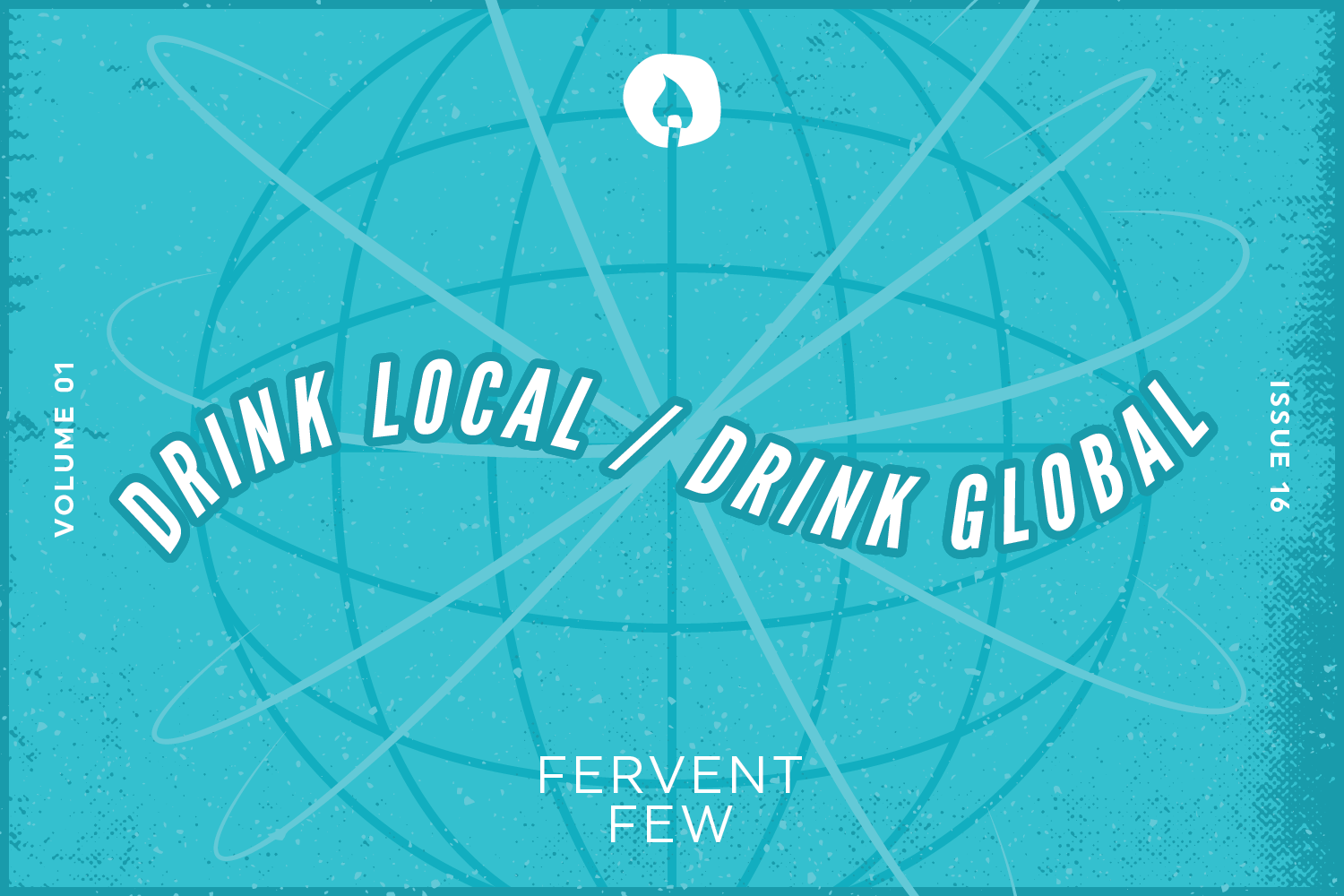Beer people love to travel. Visiting beloved breweries, tracking down a whale we’ve always wanted to try, and meeting other beer fans are just a few reasons why we’re always excited to visit a new place. But what do we try when we’re at the newest brewpub or hottest craft beer bar in town? Do we stick to the styles we’re familiar with or drink regionally?
This week, we ask the Fervent Few do you only guzzle NE IPAs while in New England, or do you branch out and try a Stout? Do you order flights in San Diego or stick to classic, west-coast-style hop bombs? Let's find out the whats and whys of ordering beer on the road.

Dave Riddile: “Even though most breweries are making the same spectrum of styles, there are also idiosyncrasies in the beers from each brewery. I really prefer to judge beer brewery by brewery instead of by region. There are obviously people making ‘New England’-style IPAs very well on the west coast, Nashville, etc.”

Hmichael: “I almost always go with what the brewery or region is known for. To me, that's part of the experience. It's the same reason I don't tend to eat at a chain restaurant that's the same everywhere when traveling. Just as I said earlier, trust the locals. Plus, it's super fun to discover a really great beer in a style you don't normally drink.
I'd rather enjoy a very well made Brown Ale that a brewery is proud of rather than a west coast IPA they felt the need to produce to check the box. Give me the beer the brewer is passionate about. Regardless of style or my drinking habits.”

Brad Redick: “I don't travel as much as I'd like, but I suppose I tend to strike a balance when I do in terms of what I seek out. If you're a good brewery, but you're making malt forward stuff then I'll pass. Regardless of how good you are, it's not enough to overcome my dislike of those styles.
I'll try IPA everywhere. I don't care what style or region you represent relative to what you're making. If I go to San Diego, I'm definitely hitting up Modern Times in hopes that they have Hazy NE IPAs on tap. If I'm in an area that has a brewery taking the farm to tank approach, I'll always seek them out. Part of this question comes down to brewing talent in a given area. Places like San Diego, Portland, Denver have established scenes. There's brewing talent there that has been cultivated and growing for 20 years. I'm much more likely to go to those places and say ‘give me what you're good at.’”

KC Cupp: “When I travel, my goal is to find the best local brewery and try a flight of what they recommend. By having the brewery suggest what to try, I get to experience a diversity of beers that take me outside of my usual, typical beer styles.”

Tait Forman: “I feel fairly safe for the most part ordering the style of beer I want wherever I may travel to. Certainly, if a region is known for a style or type of beer, I'll try it, but I find more often than not that I'll be able to find something I would normally want to drink at home. More specifically, I don't have to shrug my shoulders and ‘settle’ for a beer I usually wouldn't order just because that's what the region or city is known for.”

Zack Rothman: “I will often research local breweries before I take a trip somewhere to see which are doing the most interesting things or have the best regional reputations. I'll then plan to visit those breweries and drink something uniquely local while I'm there. There's nothing like having a West Coast IPA on the West Coast, a Florida Weisse in Florida, or a New England IPA in New England. There's a reason certain regions have become known for particular styles of beer, and those styles just aren't quite the same outside of those regions.”

Mark Twig: “I don’t want to go into an industrial unit brewery making identical beers to any other brewer in the world who uses the same malts, same yeast, and same hops. What am I getting from that experience? Definitely if there is anything of the area in a beer, that will be getting more attention immediately.”

Caldwell Bishop: “For me, I don't actually know enough about regional styles to really seek them out when traveling. I can surmise that a NE IPA is associated with New England, and West Coast IPA the west coast, but outside those obviously branded styles, I couldn't tell you what beer style(s) New England, the west coast, etc. are known for.
So, in the past, I tended to base my decisions on just doing some research online to see where looks like they have styles that will interest my fiance/travel companions. And generally speaking, my goal has been to make sure I lead people to somewhere that will be fun for everyone.”

Mike Sardina: “Have done a decent amount of travel for beer within the last 3-4 years, my motivations and desires vary widely, and a lot of that is dependent on the destination. If I'm heading somewhere where a beer is notoriously only available, you know for sure that I'm seeking that beer out. Think Zombie Dust in Chicagoland, or Blind Pig in Northern California. (Sidebar: Blind Pig really is that much better than Pliny.) If I'm visiting a spot where I have friends, I'm going to be generally going to their brewery and drinking beers there. A good example would be River North in Colorado. Every time in Denver I am absolutely heading to say hi to Patrick and those guys and drink their White. If I'm traveling back to Vermont, I'm pretty much only interested in drinking Hill Farmstead. As I get older and travel more, I'm probably going to be more conservative in reaching for a beer that I know will be good. If that beer happens to be local, even better.
Then again, I can't say that I haven't been in a situation where I'd be hundreds of miles away from home, only to order a beer from back there. Happened countless times to me when I lived in California. Something about seeing Pivo on draft just gets me stoked.”

Shannon Crawford: “I love figuring out what a region or brewery is good at and then drinking that even if it's not something I'd usually drink. If I'm in Oregon and head to Heater Allen, I'm not going to ask for a Pale Ale since they focus on Lagers. If I'm at Fonta Flora and their Brown Ale is on draft, I'm gonna hit that even though I don't usually like most Brown Ales. I think it's more exciting to search out what an area does well and drink what it's known for—otherwise you might really miss out on an eye opening experience. This all goes back to making generalizations about styles.’I don't like IPAs. I don't like Amber Ales. I don't like Table Beers.’ I really wish folks would get away from [that]. There's probably one of those out there that you like but you maybe haven't found it, which is why traveling to other places is great. I like to keep an open mind and try something I usually wouldn't or something that may not be super sexy and trendy at the moment because if it's made well I'll probably like it, whatever the style.”

William Kuttruff: “I am attracted to IPAs, but will try what is solid in a particular region. When I travel to Frankfurt I generally hit up the same craft beer bar and try the European styles of beer. I am at Stone Berlin right now enjoying their 1st Anniversary DIPA and looking at their ‘brewed in Berlin’ menu. I see that they had just kicked an NE IPA called Pineapple Picker, so the multinational Brewery is bringing regional styles across the pond.
I look for the most flavorful beer I can find in the region I am visiting. In the UK, I like cask beers or those from the BrewDog, Beavertown, The Kernel, and Camden Town (I am still a UK newbie.) The Hop Locker was an awesome pop up spot on the Thames to discuss and get quality brew. When in Germany, I tend to drink Hefeweizens and Pils, but that will change with the seasons towards Marzen, Dopplebock, etc.”

Ian Davis: “I think of it the same way I think of good food. If I’m in New England, I will drink as the New Englanders do: hazy, fruity, juice bomb IPAs. If I’m in a beach town, I want fresh seafood. I think consumables have to be thought of from a quality and freshness standpoint and if I’m headed someplace that has access to better ingredients and skill with said ingredients, I want to experience that. I do tend to plan as much as I can around beer while on my vacations. Most recently we went to Myrtle Beach and I found a killer craft beer bar called Atlas amongst the hustle and bustle of south Myrtle. I also made sure to drink the local offerings. Yes, that also meant Wicked Weed, despite my thoughts on the topic. When traveling I like to stick to the motto of ‘when in Rome.’”

Threefrenchs: “I don’t pick a style based one the area, but I will pick a beer or brewery that is known for a certain style. For example, when in Chicago, my first beer is always from Metropolitan. I do a lot of beer traveling in the States. My goal for each of the last three years was to stop at 100 different breweries. Two years ago, 99. Last year, about 125. This year has been tough, but sitting at about 68 breweries. I guess I travel more for beer, and less for a specific beer.”

Nick Naretto: “Location and regionality don’t necessarily play into the beer that I drink while traveling. I usually look for what the brewery does best and what taproom-only releases they have on tap. Sometimes that does line up with what is popular in the region, but I mainly focus on what's good and what they are known for or what I can get that will be unique to my visit because it is a taproom-only release.”

Alyssa Pereira: “During my last international trip, in Peru, I looked for chicha and fruited and tea beers, but I loved to see how they made traditional Saisons, Pilsners, and IPAs their own, too. Not everything was amazing (their craft beer scene is pretty nascent), but overall I thought these takes on the styles were super interesting in how different from the hella hoppy beers in Northern California.
Sierra Andina, BarBarian, and Valle Sagrado made some standouts, many of which were maltier and sweeter than you'd see here in this CA bubble, and included adjuncts that we don't have access to or just wouldn't use because they wouldn't sell here. Some styles of American beers are becoming so homogenized across the country that it was great to see such a liberal use of creative ingredients and techniques. It seemed to me that variety is so important to these craft brewers, maybe because they're absorbing influences from everywhere. For me, the importance of recognizing that value in creativity is a refreshing outlook to carry home.”

Halfway through this week’s conversation there was a brief but interesting sidebar about terroir.

Dave Riddile: “I'd say identifying the terroir of your ingredient and beer—IE: Missouri Wild Ale—is different than claiming that as a style of beer. Maybe I misunderstood, but I think it is important to be forthcoming about ingredient especially when terroir may be the flavor point that makes that beer unique or special within its category. That terroir, in a sense, makes it a regional or localized beer, but not its own style.”

Brad: “But when it comes down to it...without the specific text which tells me these efforts either on the label or in the name, I would have no idea of that context. And without unique & repeatable taste/characteristics, I think it's difficult to truly create that a definitive terroir of where that beer is from.”

Andrew Nations: “At what point is it branded that way just for the sake for being different? Gonna go out on a limb and say Missouri Wild Ale will never be a thing regardless of how great [Side Project] beers are.”

Mark Twig: “Seasonal beers. Love the concept of what they have the potential to do. I’d just love for us not to have to be exposed to token seasonality so much. If you grow pumpkins or your farmer down the road grows them, then epic: I’d love to drink your pumpkin beer that was made with a local/house yeast. That would be terroir. And that would do what I think seasonal beers set out to do, in ethos.”

We’d love to have you join us in the Fervent Few! Visit Patreon.com/goodbeerhunting to subscribe then come hang with us on Slack. Tell us what you like to drink when you travel and add your favorite bars and breweries to our travel map.










